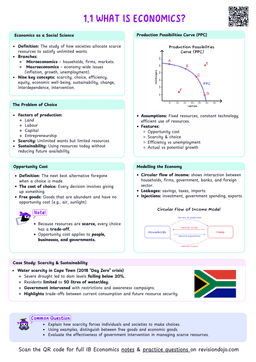Trade strategies
- Strengths of import substitution include:
- Protects and develops infant domestic industries
- Creates local jobs and industrial capacity
- Reduces dependency on foreign imports
- Helps conserve foreign exchange reserves
- Limitations of import substitution are as follows:
- Often leads to inefficient production
- Higher prices for domestic consumers
- May create protected monopolies
- Reduced access to foreign technology
India's automobile industry under import substitution (1950s–1980s):
- Strength: Established domestic manufacturers like Tata Motors
- Limitation: Limited consumer choice and high prices due to lack of competition
Moving from protecting domestic industries, let's examine how countries can promote international trade.
- Strengths of export promotion are as follows:
- Generates foreign exchange earnings
- Creates competitive industries
- Achieves economies of scale
- Attracts foreign investment
- Limitations of export promotion are that it is:
- Vulnerable to global market fluctuations
- May lead to over-dependence on exports
- Requires significant initial investment
- Faces tough international competition
South Korea's electronics industry:
- Strength: Samsung became a global leader through export focus
- Limitation: Vulnerable to global economic downturns, as seen in 2008
Market-based policies
These policies aim to increase economic efficiency through market mechanisms.
- Strengths of trade liberalisation:
- Increases competition and efficiency
- Provides access to new technologies
- Lower prices for consumers
- Wider product choice
- Limitations of trade liberalisation:
- May destroy local industries
- Can increase unemployment
- May worsen income inequality
- Causes initial economic disruption
- Strengths of privatisation:
- Improves operational efficiency
- Reduces government spending
- Attracts private investment
- Better service quality
- Limitations of privatisation:
- May lead to job losses
- Can create private monopolies
- May increase prices
- Possible foreign ownership concerns
Don’t forget that the success of market-based policies heavily depends on:
- Proper regulation
- Strong institutions
- Gradual implementation
- Safety nets for affected groups
Having examined market-oriented approaches, we now turn to government interventions that address market failures.
Interventionist policies
Sometimes markets alone cannot achieve development goals, necessitating direct government action.
- Strengths of interventionist policies:
- Reduces income inequality
- Provides social protection
- Helps vulnerable groups
- Maintains social stability
- Limitations of interventionist policies:
- High fiscal costs
- May reduce work incentives
- Administrative challenges
- Possible market distortions
Brazil's Bolsa Familia:
- Strength: Lifted millions out of poverty
- Limitation: High fiscal cost and dependency concerns
The success of both market and interventionist policies depends heavily on physical infrastructure.
Infrastructure development
Physical infrastructure provides the foundation upon which other development strategies can build.
- Strengths:
- Creates economic foundation
- Provides long-term growth benefits
- Improves productivity
- Attracts investment
- Limitations:
- Involves huge initial costs
- Requires long implementation time
- Faces maintenance challenges
- Potential environmental impacts
While domestic resources are important, external support often plays a crucial role in development.
Foreign investment and aid
External resources can accelerate development when properly managed.
- Strengths:
- Brings capital and technology
- Creates employment
- Enables knowledge transfer
- Provides quick resource access
- Limitations:
- Possible dependency
- Profit repatriation
- May crowd out local firms
- Can distort local markets
Does foreign aid create sustainable development or perpetual dependency? How do we measure its true effectiveness?
Beyond physical and financial resources, institutional frameworks determine how effectively other strategies work.
Institutional changes
Strong institutions make other development strategies more effective.
- Strengths of institutional changes:
- Long-term sustainable impact
- Empowers local population
- Reduces corruption
- Improves efficiency
- Limitations of institutional changes:
- Slow to implement
- Cultural resistance
- Political challenges
- Resource intensive
Property rights reform in Peru:
- Strength: Increased investment and lending
- Limitation: Long implementation time and political resistance
Given the global nature of development, international organizations play a significant role.
International organisations
These organisations provide crucial support but come with their own challenges.
- Strengths:
- Provides significant resources
- Offers technical expertise
- Supports crisis management
- Enables global coordination
- Limitations:
- Comes with strict conditions
- Often a one-size-fits-all approach
- Subject to political influence
- Raises sovereignty concerns
Beyond traditional approaches, innovative solutions through social enterprise offer new possibilities.
Social Enterprise and NGOs
These organisations bridge gaps between market and government solutions.
- Strengths:
- Innovative solutions
- Strong local knowledge
- Focused approach
- Social impact priority
- Limitations:
- Limited scale
- Resource constraints
- Dependency on donors
- Coordination challenges
Remember that successful development usually requires:
- Multiple complementary strategies
- Strong institutional framework
- Long-term commitment
- Local context adaptation
Understanding how these strategies work together is crucial for successful development planning.


